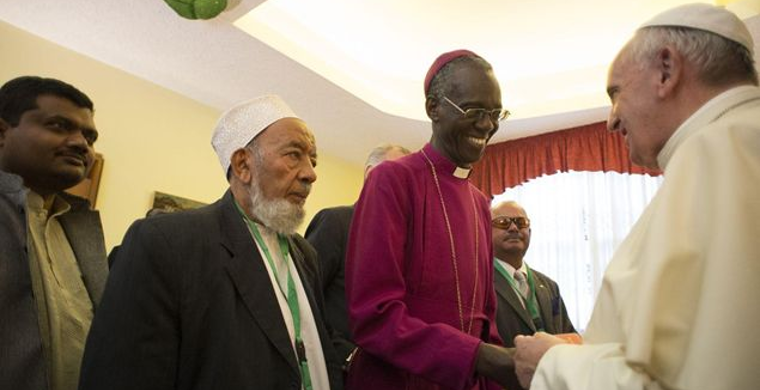Archbishop Wabukala welcomes Pope Francis to Kenya
http://www.anglicannews.org/news/
November 27, 2015
Archbishop Eliud Wabukala, Primate of the Anglican Church of Kenya, has welcomed Pope Francis to his country at the start of the Pope's visit to Kenya, Uganda and the Central African Republic.
At a meeting of ecumenical and inter-religious leaders at the Papal Nunciature, Dr Wabukala said that the Papal visit was "a great encouragement for all the Christians of Kenya as we seek to follow our Lord and Saviour Jesus Christ through faithful discipleship."
Africa, Dr Wabukala told the Pope, "is at a spiritual crossroads. We have many nominal Christians, but not as many committed ones. We are threatened by what you yourself have described as 'ideological colonialism' of these secularist lifestyles. So it is my prayer that all our churches will work together in proclaiming the gospel of Jesus Christ, crucified and risen, to kindle the hearts and minds of all believers anew."
Dr Wabukala expressed gratitude to Pope Francis for the Roman Catholic Church's "historic commitment to the apostolic faith," adding: "We commend your leadership in convening the Synod on Family in October 2015, reaffirming the sanctity of life; and the wholeness of marriage and the necessity of family, at a time when some of these principles are being called into question. As African Christians we cherish family, as taught in scripture."
And he thanked him for his encyclical on the environment, Laudato si', for "urging all nations to adopt a circular model of production, capable of preserving resources for present and future generations, while limiting as much as possible the use of non-renewable resources, moderating their consumption, maximizing their efficient use, reusing and recycling them as one way of counteracting the throwaway culture which affects the entire planet."
The leaders of the churches in Kenya "strive to practice interdependence instead of unhealthy competition in the provision of spiritual leadership to our people," Dr Wabukala said. "I laud the cordial existence between most denominations and religions in Kenya. Our hope and prayer is that this interdependence and collaboration will be sustained."
He said: "It is our deep conviction . . . that the transformations we long to see in this world are most likely to come about when our Christians are focused not on earthly utopias, but live as sojourners to whom the hope for heaven is real, founded on the faith we affirm in God Almighty, Creator of everything visible and invisible, in Jesus Christ; in the Holy Spirit, in the Communion of Saints; in forgiveness of sins and in life everlasting.
"In the recent past as a nation we have witnessed increased activities of terrorism and radicalism, threatening peaceful coexistence and integration within and across faiths and communities in Kenya.
"As faith leaders representing our members we have endeavoured to promote peaceful coexistence. In your messages you have been reminding all people of goodwill that peace is essential for the life in abundance that the Gospel proclaims.
"We shall continue to cooperate and collaborate as faith leaders in promotion of peace and national cohesion."
In response, the Pope thanked Dr Wabukala and also Professor El-Busaidy, who had brought greetings from the Muslim community of Kenya.
"It is always important to me that, when I come to visit the Catholic faithful of a local Church, I have an occasion to meet the leaders of other Christian communities and religious traditions," Pope Francis said. "It is my hope that our time together may be a sign of the Church's esteem for the followers of all religions; may it strengthen the bonds of friendship which we already enjoy.
"To be honest, this relationship is challenging; it makes demands of us. Yet ecumenical and interreligious dialogue is not a luxury. It is not something extra or optional, but essential, something which our world, wounded by conflict and division, increasingly needs.
"Indeed, religious beliefs and practice condition who we are and how we understand the world around us. They are for us a source of enlightenment, wisdom and solidarity, and thus enrich the societies in which we live. By caring for the spiritual growth of our communities, by forming minds and hearts in the truths and values taught by our religious traditions, we become a blessing to the communities in which our people live.
"In democratic and pluralistic societies like Kenya, cooperation between religious leaders and communities becomes an important service to the common good. In this light, and in an increasingly interdependent world, we see ever more clearly the need for interreligious understanding, friendship and collaboration in defending the God-given dignity of individuals and peoples, and their right to live in freedom and happiness.
Addressing the issue of terrorism, and recent attacks in Kenya, Pope Francis said that God's "holy Name must never be used to justify hatred and violence.
"I know that the barbarous attacks on Westgate Mall, Garissa University College and Mandera are fresh in your minds. All too often, young people are being radicalized in the name of religion to sow discord and fear, and to tear at the very fabric of our societies.
"How important it is that we be seen as prophets of peace, peacemakers who invite others to live in peace, harmony and mutual respect! May the Almighty touch the hearts of those who engage in this violence, and grant his peace to our families and communities."














